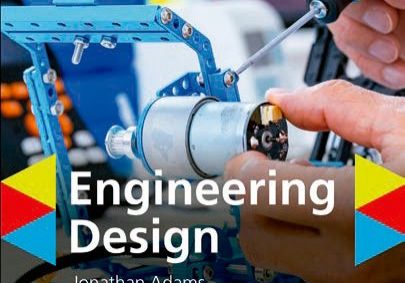An Education in Lifting
Jan 1, 2021

A “Lifting Lesson in a Bag” could ignite interest in the industry among school children.
By Ross Moloney
As a global association, everyday operations at the Lifting Equipment Engineers Association (LEEA) have been impacted by the pandemic but, from the beginning of the lockdown restrictions in March 2020, we were able to pivot remarkably quickly. No better example has been in maintaining learning and development, which is a fundamental objective for the sustainability of any industry.
Even before lockdown, the association had already been exploring innovative ways to deliver more training to the membership: LEEA training has been available online for some time. In April, we launched the online course in Mobile Crane Examinations. This meant that all of our core modules were available through the LEEA Academy.
LEEA launched the academy in 2016 to offer a range of courses designed to raise standards in the examination and inspection of in-service lifting equipment across the world. It has been a great success, with over 1,000 qualifications issued to LEEA members worldwide and, in the autumn of 2019, it received a Bronze Award in the “Best Learning and Professional Development” category at the Association Excellence Awards.
A completely revamped LEEA Academy is due to be launched in April 2021. We have a project team dedicated to carrying out this revamp, which will result in members benefitting from new and revised training courses, new methods of assessment, improved interactive eLearning, high-end Zoom training courses, training courses in languages other than English and much more as part of our all new LEEA Qualifications Framework. We also have a new curriculum including modified diploma course titles and a planned Master Technician level qualification.
We rolled out our first Zoom-based training in June 2020. Deploying video conferencing had been on our minds for some time, though prior to the pandemic, the thought of training staff using video conferencing was something most of us probably turned away from. But, since March 2020 we all now have considerable experience conducting business and managing our social lives this way. So, our Zoom-based training seems set to stay as an option post COVID-19.
Last August, we began to resume face-to-face training at our Huntingdon training centre, with smaller-than-usual classes and COVID-secure measures in place. In so doing, we reshaped the delivery of our training in 2020; while face-to-face training has reduced, there has been more online training than ever before, and our Zoom numbers are extremely pleasing.
Despite the continuing barriers we face due to COVID-19, LEEA has devised other innovative ways to support our members in their people development, including efforts towards ensuring the future sustainability of the lifting sector. Finding the next generation of engineers is one of the most pressing concerns in our industry – one that comprises a set of very specialised and technical occupations where skills cannot be transferred easily. We were consistently hearing from our members how they were struggling to engage with the next generation.
Eventually, we hope they work for a leea member and join the association themselves. it could all start with a lesson in a bag.
Think Lifting: A Lesson in a Bag
LEEA resolved to take action through launching the Think Lifting concept as part of a set of measures designed to plant the seeds of a sustainable future industry. The aim of the new school engagement programme was to bring the opportunities of entering the lifting industry to the attention of pre-option secondary school children, aged 11-13, through linking them to the local lifting sector.
Performing a vital function in the supply chains of numerous sectors, lifting will play a crucial part in the post-pandemic recovery and offer exciting employment opportunities in manufacturing, construction, aeronautical, entertainment, medical, oil and gas, offshore, renewable energy, the military and logistics sectors. But it remains mysterious to young people.
We therefore want to show school children how engineering is a skilled, attractive and varied occupation, where they can find themselves on-site doing a multitude of tasks. Originally, the scheme would see lifting companies visiting local school classrooms to conduct the lessons. But with the advent of the pandemic, the association changed its approach so that the Think Lifting School Lesson can now be delivered remotely, thus ensuring compliance with any pandemic regulations around schools.
So, the Think Lifting School Lesson in a Bag was launched, in association with Lift & Hoist International (LHI) magazine. The ready-to-use pack — all contained in a bag bearing the LEEA and LHI logos — includes experiments and leave-behind handouts that will allow lifting sector companies to engage remotely with their local schools to help raise awareness of the lifting industry. Films that seek to explain the importance of lifting in the world around us, as well as the opportunities that exist in the industry, a PowerPoint presentation and other resources for the lesson can be downloaded at leeaint.com.
Aimed at 11- to 13-year-old, pre-option pupils — i.e., before choosing which GCSE exams to take in the U.K. – the PowerPoint presentation is designed for a 40- to 50-min lesson and can be adapted, allowing the tutor company to tell pupils a little about themselves. There is also a homework PDF handout covering pneumatics, friction and pulleys. There are 12 complete kits in the pack, working on the basis of a maximum of 36 pupils in a class, divided into groups of three.
The lesson begins with a look at hydraulics and pneumatics — the first step to becoming a lifting engineer. Pupils are then given three, 10-min experiments to perform, with the first being to build a pneumatics machine. The next examines friction by presenting a challenge to lift a bottle using only rice and a chopstick. The final experiment is the “Da Vinci Bridge,” which tasks students with building a structure that can bear a 200-kg weight, suspended at a height of at least 5 cm for at least 10 s but using only the 30 popsicle sticks provided. A stop motion demonstration at the end of each experiment demonstrates how it should be done.
The lesson also features a Think Lifting film at the beginning and one at the end. In addition, there are handouts for the tutoring company to leave behind along with its own literature. The handouts have been written by a student about to begin a degree at Oxford University, as we wanted somebody who knows how to communicate effectively with young people.
The objective of the lesson is to have some fun; try and convince pupils that science matters in the everyday world and not just in labs; apply scientific principles to practical lifting; demonstrate that lifting is a part of many industries; and introduce students to some interesting jobs.
LEEA members wishing to take part will be sent three learning packs to enable them to get going, and members can then purchase further materials via online retailers. Non-members are welcome to download the resources from leeaint.com and buy their own experiments.
Having obtained this complete “lesson in a bag” from LEEA, all the company then has to do is contact the school, scout group or youth club to inform it that it wishes to send a bag with everything required in it for a 40-min lesson. They then arrange a Zoom call with the school to conduct the lesson with students remotely.
If we can spark interest among school pupils in pursuing a career in the lifting industry, we must ensure there are no barriers to entering the industry. They can, of course, enter already via an in-job training program or university. However, an important new path opens up with the imminent availability of the L3 Lifting Apprenticeship in England. The standard has been approved and LEEA has been approved as an End Point Assessor Organisation, which, in itself, is no small feat. We currently await training providers to have their costing submissions assessed.
We want companies and learners to see the apprenticeship as the gateway to working with a combination of new designs, new development, concepts, new materials, defined approaches in accordance with regulations and legislation.
There is a clear demand from employers across the country for an apprenticeship that brings young people and those seeking a career change equipped with new ideas, “soft skills” and fresh thinking into our industry. Eventually, we hope they work for a LEEA member and join the association themselves. It could all start with a lesson in a bag.
Our industry has been hidden away for too long. It is time to bring it into the classroom, so I would urge the lifting sector to get involved in delivering this lesson – after all, what could be more fulfilling than teaching our potential next generation about our industry?
To obtain the Think Lifting School Lesson, you may email [email protected]. More details can be found on leeaint.com. All necessary details on the apprenticeship (reference code ST0872) are available on the Institute for Apprenticeships website at ow.ly/MF0050AM0WH.
About LEEA
The Lifting Equipment Engineers Association (LEEA) is established across the globe as the leading representative body for all those involved in the lifting industry worldwide. It is the respected and authoritative representative body for its members, who work in every aspect of the industry, from design, manufacture, refurbishment and repair, through to the hire, maintenance and use of lifting equipment.
The association has played a key role in this specialised field for over 70 years, from training and standards setting through to health and safety, the provision of technical and legal advice, and the development of examination and licensing systems.
LEEA represents its members at the highest levels across a range of both public and private bodies, including various government departments as well as nationally and internationally recognised professional and technical institutions. LEEA enquiries can be asked on email via [email protected].
Get more of Elevator World. Sign up for our free e-newsletter.





